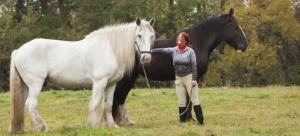 Is your horse overweight? Obesity is a major health concern for horses. “Horses carrying excess weight are at higher risk for laminitis and metabolic problems,” said Kathleen Crandell, Ph.D., longtime nutritionist at KER. In addition, overweight horses have reduced exercise tolerance and more difficulty keeping cool in hot temperatures.
Is your horse overweight? Obesity is a major health concern for horses. “Horses carrying excess weight are at higher risk for laminitis and metabolic problems,” said Kathleen Crandell, Ph.D., longtime nutritionist at KER. In addition, overweight horses have reduced exercise tolerance and more difficulty keeping cool in hot temperatures.
According to a recent survey in the U.S. and abroad, 20-50% of all horses are obese*. Most operations surveyed in Maryland managed at least one overweight horse or pony. Up to 40% of the horses and ponies were reported to be obese. Not only are there many horses carrying excess weight, but it turns out that most horse owners are unable to consistently identify equine obesity.
How to Reduce Weight
Weight reduction in horses can usually be achieved by limiting calories and increasing exercise. A horse should never be starved or fasted. Forage intake should not be less than 1% of body weight; 10 lb of forage for a 1000-lb or 450-kg horse. This constitutes an extremely restrictive intake. It is more reasonable to offer 1.5-2% of body weight in forage, plus a ration balancer, such as Micro-Max, in lieu of high-calorie concentrate products, or to top off concentrates fed below recommended levels. In Australia, look for Gold Pellet.
“Weighing horses on a regular basis, such as once or twice a month, will help owners track weight changes,” says Catherine Whitehouse, M.S., a nutrition consultant with KER. “Either a weight tape or scale, if available, is a good tool for measuring trends. Record weights and dates of measurement in a notebook or spreadsheet to easily observe changes.”
Exercise frequency can be increased as well. For example, if a horse is currently exercised two or three times per week for 20 minutes, frequency can be increased to three or four times per week for 30 minutes. Be sure to make increases in intensity slowly so the horse’s body has time to adapt.
Further, a horse does not have to work to a dripping sweat to realize the benefits of exercise. As long as physical activity is enough to raise the heart rate to approximately 60% of maximum (roughly 140 beats per minute for an average adult horse), improvements in glucose metabolism, muscle tone, and fitness can be ascertained.
Would you like help evaluating your horse’s diet? Contact us at J & J Farms by clicking here!
Article brought to you by KER.
